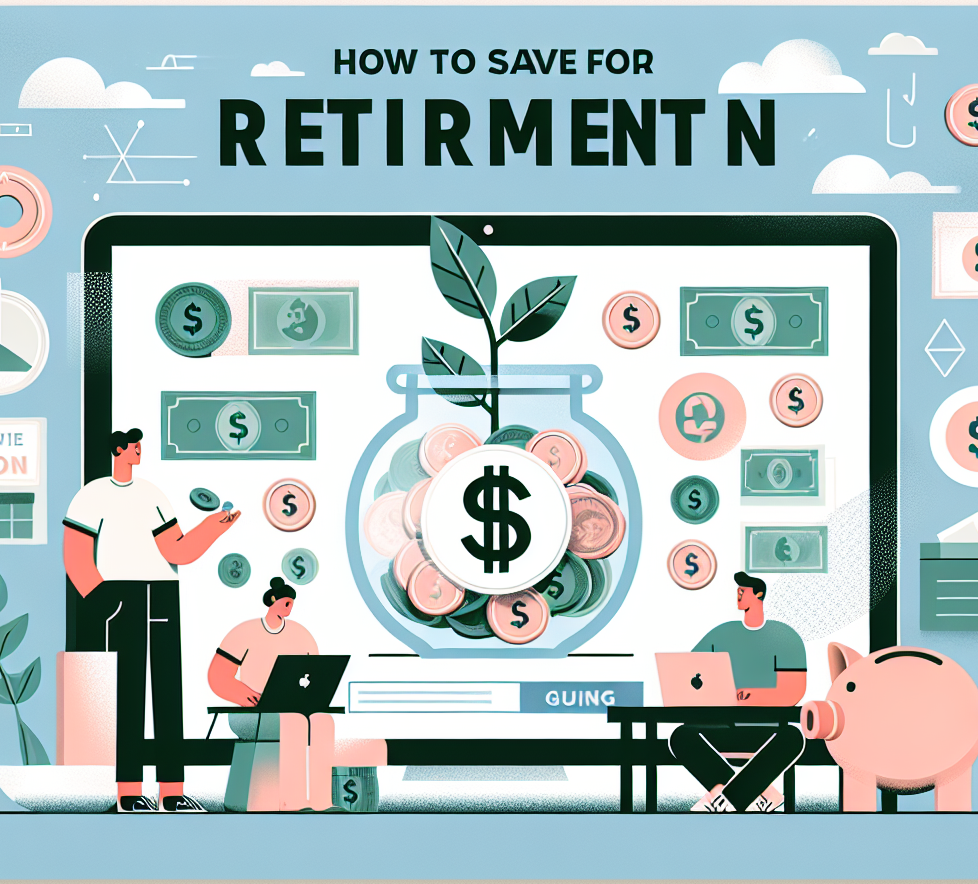
Saving for retirement can seem like a distant goal, especially when you’re young. For Millennials and Gen Z, retirement often feels far off, overshadowed by immediate concerns like student debt, rising living costs, and starting a career. However, the earlier you start saving, the more time your money has to grow through the power of compound interest. Whether you’re just beginning your career or in your mid-twenties, this guide will help you understand the importance of saving for retirement, how to set realistic retirement goals, and explore the best options to save.
Time is on your side, and the choices you make now can set you up for a comfortable future. In this guide, we’ll cover the importance of starting early, the best savings options, smart investment strategies, and practical tips for overcoming common challenges. Let’s dive into how Millennials and Gen Z can secure their financial future.
Why Millennials and Gen Z Need to Start Saving for Retirement Early
One of the biggest advantages Millennials and Gen Z have when it comes to saving for retirement is time. The earlier you start, the more time your savings have to grow. This is all thanks to compound interest—the process by which your investment earnings generate their own earnings over time.
For example, if a 25-year-old starts saving $5,000 a year in a retirement account that averages a 7% return, by the time they reach 65, they will have over $1.5 million in savings. If they wait until they are 35 to start saving that same amount, they will only accumulate about $700,000 by the time they reach retirement age. Starting early essentially doubles your retirement savings without needing to increase your contributions drastically.
But it’s not just about compound interest. Inflation is another important factor to consider. The longer you wait to save for retirement, the more you’ll need to account for rising prices of goods and services, especially in retirement. If inflation continues at an average of 3% per year, the same lifestyle in 30 years will cost you nearly twice as much as it does today.
Unfortunately, many young people feel overwhelmed by immediate financial burdens—high student loans, rising rent, and the costs of starting a family. According to a 2023 report by Bank of America, 42% of Millennials have not started saving for retirement yet, and nearly half of Gen Z feels uncertain about their financial future. This delay can lead to a significant shortfall in retirement funds later in life.
Setting Realistic Retirement Goals
One of the first steps in saving for retirement is setting clear and realistic goals. Understanding how much money you need to retire comfortably is key to devising a savings plan.
-
Estimate Your Retirement Needs: Retirement planning experts suggest that you will need 70-90% of your pre-retirement income to maintain your standard of living in retirement. For example, if you earn $50,000 a year, aim to have $35,000 to $45,000 in annual income during retirement.
-
Factor in Life Expectancy: The average life expectancy in the U.S. is around 79 years. However, many people live well into their 90s, and healthcare costs tend to increase with age. Consider how long you might live in retirement and how much healthcare could cost.
-
Retirement Age: Traditionally, people retire around 65, but some Millennials and Gen Z may choose to retire earlier or later, depending on career paths and savings goals. While retiring at 60 may be appealing, setting a retirement goal of 65 or later may give you more time to save.
To get an accurate picture of how much you’ll need, it’s important to use retirement calculators—tools that can help estimate how much you should be saving each month based on your retirement age, desired retirement income, and expected inflation. Popular calculators from Fidelity and Vanguard can help guide your goal-setting.
Best Retirement Savings Options for Millennials and Gen Z
Once you’ve set your goals, the next step is to choose the right retirement savings options. Here’s an overview of the best ways Millennials and Gen Z can begin saving for retirement:
-
401(k) Plans: If your employer offers a 401(k) plan, this is one of the best options available. Many employers match a portion of your contributions, which is essentially “free money.” Make sure to contribute enough to take full advantage of this match. For example, if your employer matches up to 5% of your salary, try to contribute at least 5% of your own.
-
IRAs (Individual Retirement Accounts): IRAs offer individuals greater flexibility. There are two main types:
- Traditional IRA: Contributions are tax-deductible, but withdrawals in retirement are taxed.
- Roth IRA: Contributions are made after-tax, but withdrawals are tax-free in retirement. The Roth IRA is especially attractive for young people since they will likely be in a lower tax bracket now than they will be in retirement.
With both options, the earlier you start, the more your money can grow. Roth IRAs, in particular, are ideal for young people who are just starting their careers and expect their income to rise.
-
Brokerage Accounts: While not strictly a retirement account, brokerage accounts can be a great way to build wealth over time. The funds in these accounts are accessible before retirement, and you can invest in a wide variety of assets, such as stocks, bonds, mutual funds, and ETFs. Brokerage accounts do not offer tax advantages, but they can help you grow your money and give you more flexibility in terms of investment choices.
-
High-Yield Savings Accounts: For those who are risk-averse, a high-yield savings account offers a safe and stable way to save for retirement. Though the returns are lower than those of stocks or bonds, these accounts provide liquidity and security, making them ideal for younger savers just starting.
-
Real Estate Investing: Buying property or investing in real estate can also be an excellent long-term strategy for retirement. Real estate generally appreciates over time and can offer rental income that can supplement your retirement savings. However, it requires more upfront capital and comes with its own set of risks.
-
Social Security: Though Social Security will likely play a role in retirement, it’s best not to rely on it as your primary source of income. The future of Social Security remains uncertain, and Millennials and Gen Z should focus on building their own savings and investments.
Smart Investment Strategies for Millennials and Gen Z
Investing is key to building wealth over time. Here are some strategies tailored to Millennials and Gen Z:
-
Start Early and Diversify: The earlier you start investing, the more time your investments have to grow. In addition to starting early, it’s important to diversify your portfolio—spread your investments across various asset classes like stocks, bonds, and real estate. This helps reduce risk while maximizing growth potential.
-
Robo-Advisors: Robo-advisors are automated platforms that manage your investments for you. They use algorithms to build and maintain a diversified portfolio based on your financial goals, risk tolerance, and investment horizon. Robo-advisors are ideal for Millennials and Gen Z who want to invest but don’t have the time or expertise to manage their portfolio actively.
-
Index Funds and ETFs: These low-cost investments are ideal for younger investors. Index funds and ETFs track the performance of market indexes like the S&P 500, giving you exposure to a broad range of companies. They have lower fees than actively managed funds and have been shown to outperform them over time.
-
Automated Contributions: Automating your retirement savings and investment contributions ensures that you’re consistently putting money aside. Set up automatic transfers from your checking account to your retirement account or brokerage account, making saving effortless.
How to Overcome Challenges in Saving for Retirement
While saving for retirement is important, there are several challenges Millennials and Gen Z face when it comes to building their nest eggs. Here’s how to overcome some common hurdles:
-
Student Debt: Many Millennials and Gen Z struggle with student loan debt, which can make saving for retirement seem impossible. However, it’s crucial to strike a balance between paying off debt and saving for the future. Consider enrolling in income-driven repayment plans or refinancing your student loans to lower interest rates. At the same time, try to contribute a small percentage to your retirement accounts to take advantage of compounding.
-
High Cost of Living: Rising rent, healthcare costs, and other living expenses make it difficult to save. But cutting back on discretionary spending, such as dining out or subscriptions, can free up money to save. Track your expenses using budgeting apps like Mint or YNAB (You Need a Budget) to ensure that you’re saving enough for retirement.
-
Gig Economy Jobs: If you’re working multiple jobs or freelancing, saving for retirement can be tricky due to inconsistent income. However, it’s still possible to save. Open an IRA or a solo 401(k) to take advantage of tax-deferred growth, and try to save a percentage of each paycheck, even if it’s small.
Practical Tips to Make Retirement Saving Easier
-
Start Small: Don’t worry about contributing large amounts at first. Starting with just a small percentage of your income is a great way to begin building a retirement fund. Even contributing just 5-10% of your monthly income can make a significant difference over time.
-
Utilize Employer Benefits: Take advantage of any retirement-related benefits offered by your employer, including 401(k) matching, financial counseling, and other tools.
-
Track Your Progress: Regularly monitor your retirement savings goals. Use financial apps like Mint or Personal Capital to track how well you’re doing. Tracking progress can help you stay motivated and make necessary adjustments to your saving habits.
-
Review Your Plan Annually: As your life and financial situation evolve, so should your retirement plan. Review your savings goals and investment choices yearly to ensure you’re on track to meet your retirement needs.
Starting to save for retirement as a Millennial or Gen Z might seem daunting, but the sooner you begin, the better off you’ll be in the long run. By setting clear goals, taking advantage of employer retirement plans, diversifying your investments, and automating your savings, you can set yourself up for financial independence and a comfortable retirement. Remember, time is your most valuable asset—start saving today, and let your money grow for tomorrow.
Visit our other website: https://synergypublish.com


